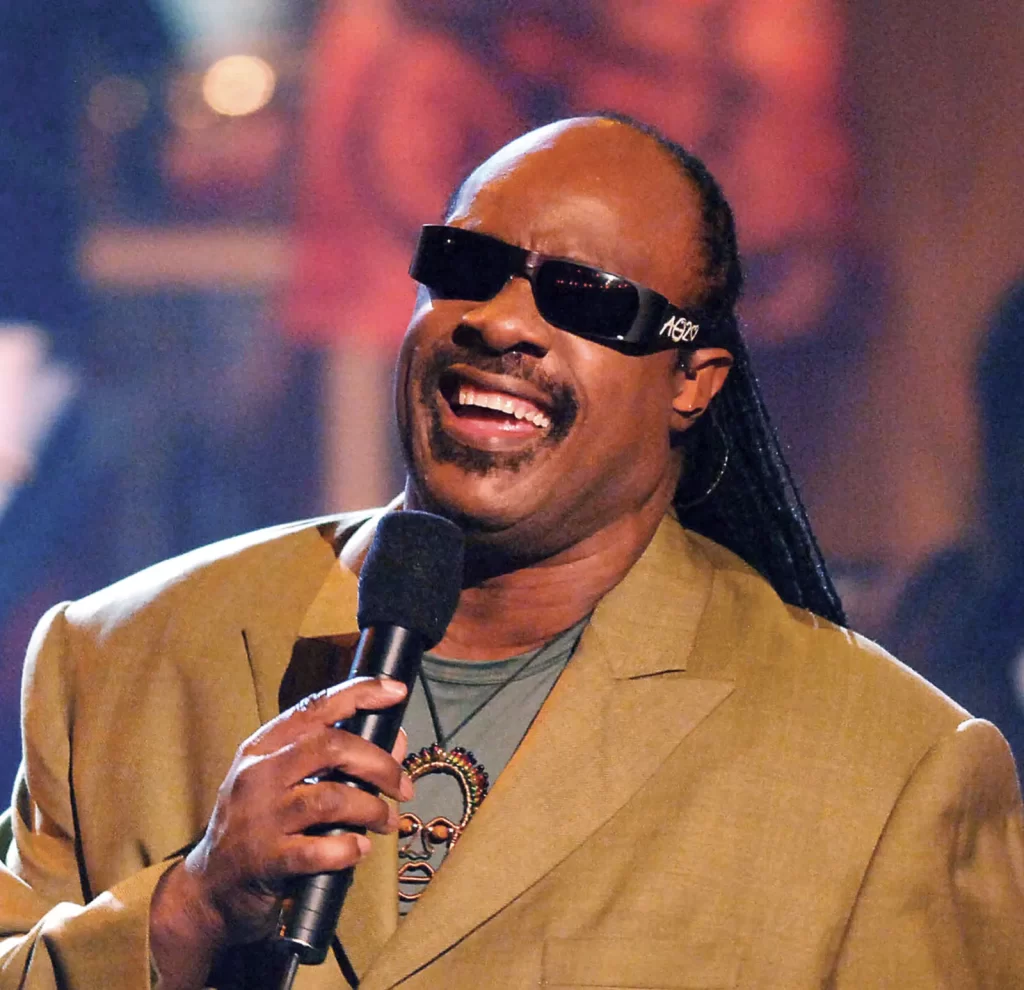STEVIE WONDER

Stevland Hardaway Morris (né Judkins; May 13, 1950), known professionally as Stevie Wonder, is an American singer-songwriter, musician, and record producer. He is credited as a pioneer and influence by musicians across a range of genres that include R&B, pop, soul, gospel, funk, and jazz. A virtual one-man band, Wonder’s use of synthesizers and other electronic musical instruments during the 1970s reshaped the conventions of contemporary R&B. He also helped drive such genres into the album era, crafting his LPs as cohesive and consistent, in addition to socially conscious statements with complex compositions. Blind since shortly after his birth, Wonder was a child prodigy who signed with Motown’s Tamla label at the age of 11, where he was given the professional name Little Stevie Wonder.
Wonder’s single “Fingertips” was a No. 1 hit on the Billboard Hot 100 in 1963, at the age of 13, making him the youngest artist ever to top the chart. Wonder’s critical success was at its peak in the 1970s. His “classic period” began in 1972 with the releases of Music of My Mind and Talking Book, the latter featuring “Superstition”, which is one of the most distinctive and famous examples of the sound of the Hohner Clavinet keyboard. His works Innervisions (1973), Fulfillingness’ First Finale (1974) and Songs in the Key of Life (1976) all won the Grammy Award for Album of the Year, making him the tied-record holder for the most Album of the Year wins, with three. He is also the only artist to have won the award with three consecutive album releases. Wonder began his “commercial period” in the 1980s; he achieved his biggest hits and highest level of fame, had increased album sales, charity participation, high-profile collaborations (including Paul McCartney and Michael Jackson), political impact, and television appearances. Wonder has continued to remain active in music and political causes.
Wonder is one of the best-selling music artists of all time, with sales of over 100 million records worldwide. He has won 25 Grammy Awards (the most by a solo artist) and one Academy Award (Best Original Song, for the 1984 film The Woman in Red). Wonder has been inducted into the Rhythm and Blues Music Hall of Fame, Rock and Roll Hall of Fame and Songwriters Hall of Fame. He is also noted for his work as an activist for political causes, including his 1980 campaign to make Martin Luther King Jr.’s birthday a federal holiday in the U.S. In 2009, he was named a United Nations Messenger of Peace, and in 2014, he was honored with the Presidential Medal of Freedom.
Wonder was born Stevland Hardaway Judkins in Saginaw, Michigan, on May 13, 1950, the third of five children born to Lula Mae Hardaway, and the second of Hardaway’s two children with Calvin Judkins. He was born six weeks premature which, along with the oxygen-rich atmosphere in the hospital incubator, resulted in retinopathy of prematurity, a condition in which the growth of the eyes is aborted and causes the retinas to detach, so he became blind.
When Wonder was four, his mother divorced his father and moved with her three children to Detroit, Michigan, where Wonder sang as a child in a choir at the Whitestone Baptist Church. She later rekindled her relationship with her first child’s father (whose surname was also coincidentally Hardaway) and changed her own name back to Lula Hardaway, going on to have two more children.
When Stevie was signed by Motown in 1961, his surname was legally changed to Morris, which (according to Lula Mae Hardaway’s authorized biography) was an old family name. Berry Gordy was responsible for creating the stage name of “Little Stevie Wonder”. He began playing instruments at an early age, including piano, harmonica, and drums. He formed a singing partnership with a friend; calling themselves Stevie and John, they played on street corners and occasionally at parties and dances.
As a child, Wonder attended Fitzgerald Elementary School in Detroit. After his first album was released, The Jazz Soul of Little Stevie (1962), he enrolled in Michigan School for the Blind in Lansing, Michigan. In 1961, at the age of 11, Wonder sang his own composition, “Lonely Boy”, to Ronnie White of the Miracles; White then took Wonder and his mother to an audition at Motown, where CEO Berry Gordy signed Wonder to Motown’s Tamla label. Before signing, producer Clarence Paul gave him the name Little Stevie Wonder. Because of Wonder’s age, the label drew up a rolling five-year contract in which royalties would be held in trust until Wonder was 21. He and his mother would be paid a weekly stipend to cover their expenses: Wonder received $2.50 (equivalent to $24.48 in 2022) per week, and a private tutor was provided when Wonder was on tour.
Wonder was put in the care of producer and songwriter Clarence Paul, and for a year they worked together on two albums. Tribute to Uncle Ray was recorded first, when Wonder was still 11 years old. Mainly covers of Ray Charles’s songs, the album included a Wonder and Paul composition, “Sunset”. The Jazz Soul of Little Stevie was recorded next, an instrumental album consisting mainly of Paul’s compositions, two of which, “Wondering” and “Session Number 112”, were co-written with Wonder. Feeling Wonder was now ready, a song, “Mother Thank You”, was recorded for release as a single, but then pulled and replaced by the Berry Gordy song “I Call It Pretty Music, But the Old People Call It the Blues” as his début single; released summer 1962, it almost broke into the Billboard 100, spending one week of August at 101. Two follow-up singles, “Little Water Boy” and “Contract on Love”, both had no success, and the two albums, released in reverse order of recording—The Jazz Soul of Little Stevie in September 1962 and Tribute to Uncle Ray in October 1962—also met with little success.













